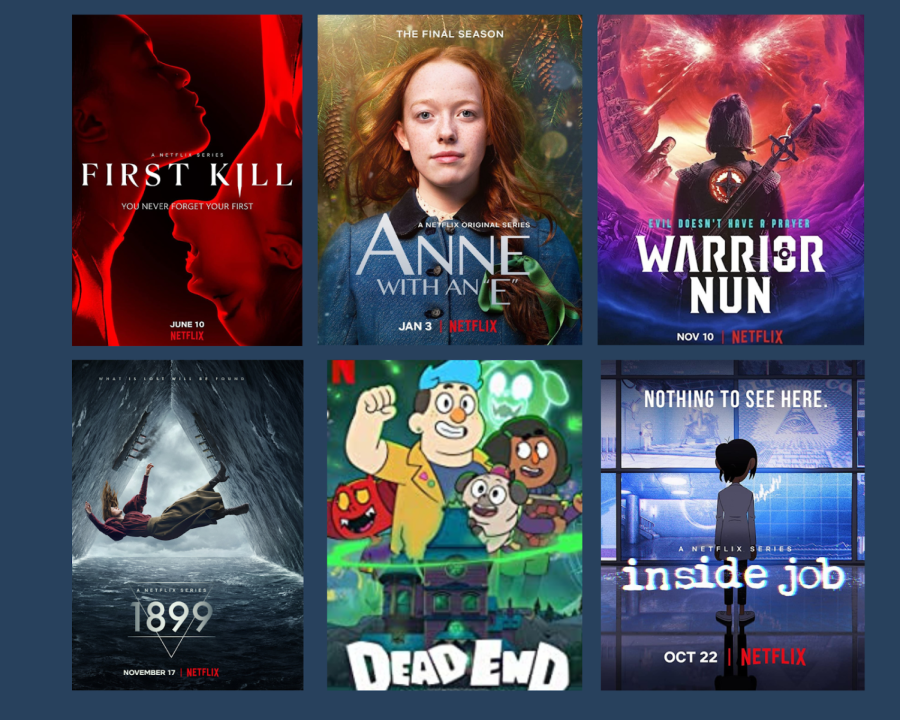Netflix just canceled your favorite show
Photo courtesy of IMDb
“Anne with an E,” “First Kill,” “Warrior Nun,” “1899,” “Dead End: Paranormal Park,” and “Inside Job” were all popular content on Netflix that were canceled and had different forms representation, like LGBTQ+ characters and character of color.
With various Netflix shows and movies being canceled, viewers are debating whether or not the expensive subscription is worth the price if their favorite content will end up being removed anyway, and if it’s following any sort of agenda or pattern.
“I’ve noticed that a lot of the shows that have been canceled on Netflix happen to be shows surrounding the LGBTQ+ community, stories around poverty, people of color, etc.,” said junior Michaela Carr.
Notably, “First Kill” and “Warrior Nun” both featured a main sapphic relationship and were canceled. “Anne with an E” had multiple episodes at the end of the first season surrounding the main character’s poverty. After being canceled, many people protested the cancellation of “Anne with an E” and created a hashtag and a petition in hopes of the show being renewed. The “Warrior Nun” cancellation was also protested, and a hashtag was created.
While Netflix usually responds to the cancellations by saying that the shows were not making enough money, students are split on whether or not this is true.
“‘Anne with an E’ was almost as popular as ‘Stranger Things’ when its final season aired. However, the show depicts racism, LGBTQ+ people, feminism, etc. I think that it’s more about the topic rather than the money or the views,” said Carr. Both Netflix and the Canadian Broadcasting System announced the cancellation.
The third season of “Anne with an E” depicted Canada’s residential schools, which indigenous children were forced to attend. The main characters befriend a young Mi’kmaq girl who gets taken. The timing of the cancellation coinciding with this storyline is seen as suspicious, especially with a previous history of canceling media depicting LGBTQ+ characters and characters of color. Adding to this, “Anne with an E” was extremely successful, winning the Canadian Screen Award for Best Dramatic Series two years in a row.
“I think that the cancellations have something to do with money, as the company has stated that it’s ‘part of business’ and that they’re thinking about the long-time revenue of the show before canceling it, but there are certainly other measures they could take to cut costs without negatively affecting viewers,” said sophomore Alexa Kelty.
Additionally, some viewers “hate-watch” shows that then become number one on Netflix, leading the creators to believe that people like the shows. “Purple Hearts,” a romance movie, received a low score of 35% on RottenTomatoes, but was on Netflix’s Top 10. This counterproductive move by fans ends up helping these hate-watched shows stay on Netflix since they become more profitable than the more well-liked shows that get canceled.
“If the company feels as though they might make money off of another pitch, they’ll pick the show that will make more money. This is why hate-watching a show can cause more harm. By watching the show, the company finds it successful because views equal money,” said senior Alyssa Hurley.
Even if the public opinion for a show or movie is relatively negative, Netflix doesn’t see that; they only see the views it gathers. However, according to Variety, Netflix canceled 20 shows in 2022 alone.
“Netflix has also canceled a lot of popular shows, and a large amount of them seem to be of the fantasy/sci-fi genre. I was particularly bitter about Netflix canceling ‘Once Upon A Time.’ I was very fortunate that Disney+ added the show to its list of shows, but others aren’t so fortunate and are forced to deal with cliff-hangers and incomplete storylines,” said Kelty. When Netflix lost licensing, “Once Upon A Time” was removed, according to Republic World.
Once a show is canceled and removed from a streaming network, it’s known as “lost media.” This means that the media is unavailable anywhere, unless it’s pirated illegally.
“If shows people genuinely enjoy turn into lost media and cannot be found, what is the point in storytelling?” said Hurley.






